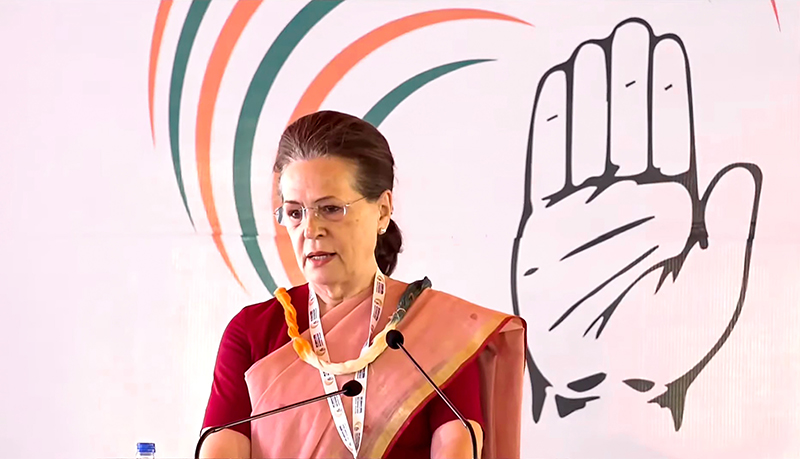 Sonia Gandhi
Sonia Gandhi
Secularism has become pejorative for those now in power: Sonia Gandhi
Thiruvananthapuram/IBNS/UNI: Describing secularism as a foundational pillar of India’s democracy, Congress leader Sonia Gandhi noted that the word secular is being used as a ‘pejorative’ by those now in power, resulting in increased polarisation in the society.
“They say they are committed to ‘democracy’, but at the same time, they weaken the safeguards meant to ensure its smooth working. The train tracks meant to guide our nation to harmony are being damaged and the results are already being seen in the increased polarisation in society,” Gandhi wrote in a signed article for Manorama Yearbook 2024.
"Democracy and secularism are deeply interconnected -- like two rails on a track, guiding the government of the day to the ideal of a harmonious society. “We are all familiar with these words, which we encounter in debates, speeches, civics textbooks, and the Preamble to the Constitution. Despite this familiarity, the deep meanings behind these concepts are often elusive. A clear understanding of these terms will help every citizen better understand India’s history, the challenges of the present, and the path to the future,” she said.
Gandhi pointed out that secularism can be interpreted in several ways but the meaning most relevant to India was the one laid down by Mahatma Gandhi in his famous term, ‘sarva dharma sama bhaava’.
“Gandhiji perceived the essential unity of all religions. Jawaharlal Nehru was deeply conscious of India being a multi-religious society, so he constantly strove to establish a secular state.”
She mentioned that India’s Constitution makers, led by Dr. B R Ambedkar, developed and applied this idea to the government, creating a unique secular democracy.
“The government…protects the religious beliefs of all. It has special provisions to protect the welfare of minorities. The guiding principle of Indian secular democracy is always to promote harmony and prosperity between all the diverse groups in our society.”
Gandhi, who was the longest Congress president - from 1998 to 2017 and from 2019 to 2022 - said India has always been defined by its extraordinary diversity.
“In fact, in our society it makes more sense to speak of ‘diversities’ instead of just ‘diversity’ since they encompass faiths and beliefs, languages and cultural practices, regions and ecologies, histories and traditions. Yet there has always been a sense of overarching unity that led our Founding Fathers to give us the legacy of Unity in Diversity,” she argued.
“Diversity strengthens our unity and solidarity when it is celebrated as indeed it is in our magnificent Constitution that is now under assault,” she said.
Gandhi also raised an important issue of democracy and its functioning. In a democracy, the government is formed by a majority of votes. “But if a majority of people agree, can they always have a way over the remainder? What happens if the core interests of a small group are hurt? What is the remedy if a temporary majority insists on taking a decision which may have grave future consequences? On the other hand, if an enduring but slim majority is formed, do they have the right to govern unchallenged?”
This question is especially grave in diverse countries such as India, where people share so many different identities which are precious to them. “If people worry that their language or religious practice or way of life could be permanently threatened only because they were not many in number, it does not help peace or harmony in society,” she noted.
Gandhi said democracy is not a perfect system, and quoted Jawaharlal Nehru’s observation: “Democracy is good. I say this because other systems are worse… It has good points and also bad.”
The freedom fighters knew from the experience of democracy in other countries that the system is prone to ailments and laid down principles to guard against these illnesses, such as a written Constitution, Fundamental Rights of citizens against the government, and the principle of secularism.
Noting that progressive people in India have always tried to find solutions to the challenges of the times, she said: “It is time for us too, to find our own solutions to the challenges of today, and in so doing, serve and honour our nation.”
Support Our Journalism
We cannot do without you.. your contribution supports unbiased journalism
IBNS is not driven by any ism- not wokeism, not racism, not skewed secularism, not hyper right-wing or left liberal ideals, nor by any hardline religious beliefs or hyper nationalism. We want to serve you good old objective news, as they are. We do not judge or preach. We let people decide for themselves. We only try to present factual and well-sourced news.







